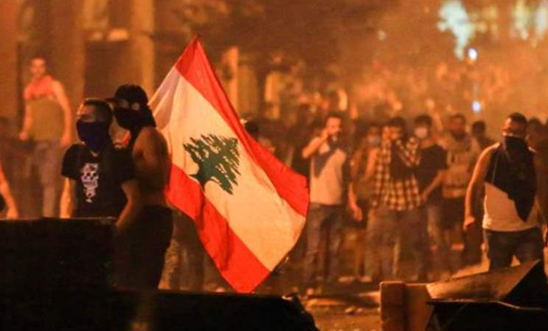
Press releases
Lebanon: army using excessive force against protesters

Live ammunition used against protesters in northern city of Tripoli
One protester describes moment he was shot four times in the stomach
‘Authorities must adopt a zero-tolerance stance to any excessive use of force against peaceful protesters’ - Lynn Maalouf
The Lebanese army has used excessive force - including live ammunition - to disperse recent protests in northern Lebanon, seriously injuring at least two people, according to eyewitness testimony and analysis of video footage, said Amnesty International today.
In the single most violent episode since the mass protests began, the army opened fire on dozens of protesters staging a sit-in in the Beddawi area of the city of Tripoli on 26 October. At least two protesters suffered gunshot wounds.
The Lebanese armed forces also violently dispersed protests in the city of Sidon and the town of Abdeh, and army and other security forces failed to intervene effectively to protect demonstrators in Beirut from violent attacks by supporters of political groups.
During the 26 October incident, soldiers from the army and army’s intelligence branch initially began beating protesters using sticks and rifle butts in an attempt to open the Beddawi road that had been blocked by protesters. Protesters responded by throwing rocks at the soldiers, followed by the army opening fire with live ammunition and tear gas grenades. At least two people were wounded.
Medical records seen by Amnesty confirm that one protester - Mohammed al-Abdallah - was hospitalised after being shot in the stomach. He described to Amnesty how a soldier opened fire even though he was standing six or seven yards away from him:
“I saw him aiming at me while I threw stones and said don’t shoot! I’ll stop throwing the stones … but he shot me four times in the stomach.”
The attack began after protesters who were singing and sitting on the ground refused army demands to clear the road. One eyewitness said:
“They ran towards us and began beating us, trampling on all of us, beating us with sticks, when several injured lay on the ground … the protesters started throwing stones at the army … so they opened fire.”
One of the protesters who was shot in the back was transferred from northern Lebanon to Geitawi hospital in Beirut for emergency surgery, according to his brother, who told Amnesty that his brother has lost the use of his lower limbs.
The Lebanese army said in a statement that soldiers attempting to clear the road in Beddawi came under attack from protesters who threw stones and firecrackers at them causing five injuries in their ranks. They said they were forced to respond with tear gas and later to shoot rubber bullets and live fire into the air, some of which caused injuries. The statement also said the army has opened an investigation into the incident.
Lynn Maalouf, Amnesty International’s Middle East Research Director, said:
“The Lebanese army’s excessive use of force in Beddawi, as well as the security forces’ failure to protect peaceful protesters, are deeply worrying and must be immediately investigated in an independent, impartial and transparent manner.
“Holding perpetrators to account must be an urgent priority. The authorities must adopt a zero-tolerance stance to any excessive use of force against peaceful protesters.”
Other examples of excessive force used
Amnesty has also documented an excessive use of force to disperse protesters in two other locations. In the northern town of Abdeh, the army attacked a group of peaceful protesters who were blocking the roads on 30 October. One protester, Omar Nasser Hazeem, described the scene:
“The army forces started advancing in our direction and we kept chanting ‘silmiyyeh’ [peaceful] and then they started kicking us with their boots and hitting us with their batons … then they started firing rubber bullets and throwing more tear gas at us. Many protesters fainted. They kept on hitting us. There were women and children with us.”
In the southern city of Sidon, more than 100 protesters who had blocked the main road were forcefully dispersed in the early hours of 28 October. One eyewitness said more than 25 vehicles arrived on the scene, with witnesses describing how army, intelligence and state security forces attacked protesters, beating them with batons and stamping on them with their boots. At least three people were hospitalised for their injuries.
Failure to protect protester from ‘thugs’
Amnesty has also documented how Lebanese security forces failed to effectively intervene to protect peaceful protesters who came under attack by supporters of Amal and Hezbollah at the Ring Highway in Beirut on 29 October. The attackers armed with sticks beat and chased demonstrators and set fire to their tents. Eyewitnesses said the Internal Security Forces (ISF) present on the scene tried to protect protesters but were vastly outnumbered by around up to 300 “thugs” who attacked the demonstrators.
One witness described scenes of “chaos” as hundreds of attackers armed with sticks and stones began attacking the protesters. Another demonstrator said:
“They were moving in an organised way to terrorise the protesters. They clearly outnumbered the ISF … I find it very strange that there were only around 50 ISF at such a critical time”.
Several witnesses said the Internal Security Forces failed to arrest any of the attackers.
Unlawful detentions
At least four people were unlawfully detained for five days by the military at recent protests before being released. During that time, they were denied access to their lawyers and family, who were not told of their whereabouts. Such detentions may amount to the crime of enforced disappearance under international law.